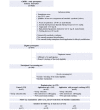Effect of Smartphone-Based Lifestyle Coaching App on Community-Dwelling Population With Moderate Metabolic Abnormalities: Randomized Controlled Trial
- PMID: 33034564
- PMCID: PMC7584978
- DOI: 10.2196/17435
Effect of Smartphone-Based Lifestyle Coaching App on Community-Dwelling Population With Moderate Metabolic Abnormalities: Randomized Controlled Trial
Abstract
Background: Metabolic disorders are established precursors to cardiovascular diseases, yet they can be readily prevented with sustained lifestyle modifications.
Objective: We assessed the effectiveness of a smartphone-based weight management app on metabolic parameters in adults at high-risk, yet without physician diagnosis nor pharmacological treatment for metabolic syndrome, in a community setting.
Methods: In this 3-arm parallel-group, single-blind, randomized controlled trial, we recruited participants aged 30 to 59 years with at least 2 conditions defined by the Third Report of the National Cholesterol Education Program expert panel (abdominal obesity, high blood pressure, high triglycerides, low high-density lipoprotein cholesterol, and high fasting glucose level). Participants were randomly assigned (1:1:1) by block randomization to either the nonuser group (control), the app-based diet and exercise self-logging group (app only), or the app-based self-logging and personalized coaching from professional dieticians and exercise coordinators group (app with personalized coaching). Assessments were performed at baseline, week 6, week 12, and week 24. The primary outcome was change in systolic blood pressure (between baseline and follow-up assessments). Secondary outcomes were changes in diastolic blood pressure, body weight, body fat mass, waist circumference, homeostatic model of assessment of insulin resistance, triglyceride level, and high-density lipoprotein cholesterol level between baseline and follow-up assessments. Analysis was performed using intention-to-treat.
Results: Between October 28, 2017 and May 28, 2018, 160 participants participated in the baseline screening examination. Participants (129/160, 80.6%) who satisfied the eligibility criteria were assigned to control (n=41), app only (n=45), or app with personalized coaching (n=43) group. In each group, systolic blood pressure showed decreasing trends from baseline (control: mean -10.95, SD 2.09 mmHg; app only: mean -7.29, SD 1.83 mmHg; app with personalized coaching: mean -7.19, SD 1.66 mmHg), yet without significant difference among the groups (app only: P=.19; app with personalized coaching: P=.16). Instead, those in the app with personalized coaching group had greater body weight reductions (control: mean -0.12, SD 0.30 kg; app only: mean -0.35, SD 0.36 kg, P=.67; app with personalized coaching: mean -0.96, SD 0.37 kg; P=.08), specifically by body fat mass reduction (control: mean -0.13, SD 0.34 kg; app only: mean -0.64, SD 0.38 kg, P=.22; app with personalized coaching: mean -0.79, SD 0.38 kg; P=.08).
Conclusions: Simultaneous diet and exercise self-logging and persistent lifestyle modification coaching were ineffective in lowering systolic blood pressure but effective in losing weight and reducing body fat mass. These results warrant future implementation studies of similar models of care on a broader scale in the context of primary prevention.
Trial registration: ClinicalTrials.gov NCT03300271; http://clinicaltrials.gov/ct2/show/NCT03300271.
Keywords: health behavior; lifestyle modification; metabolic health; mobile health.
©So Mi Jemma Cho, Jung Hyun Lee, Jee-Seon Shim, Hyungseon Yeom, Su Jin Lee, Yong Woo Jeon, Hyeon Chang Kim. Originally published in the Journal of Medical Internet Research (http://www.jmir.org), 09.10.2020.
Conflict of interest statement
Conflicts of Interest: None declared.
Figures





References
-
- Wilson PWF, D'Agostino RB, Parise H, Sullivan L, Meigs JB. Metabolic syndrome as a precursor of cardiovascular disease and type 2 diabetes mellitus. Circulation. 2005 Nov 15;112(20):3066–72. doi: 10.1161/CIRCULATIONAHA.105.539528. http://circ.ahajournals.org/cgi/pmidlookup?view=long&pmid=16275870 - DOI - PubMed
-
- Jeong JS, Kwon HS. Prevalence and Clinical Characteristics of Dyslipidemia in Koreans. Endocrinol Metab (Seoul) 2017 Mar;32(1):30–35. doi: 10.3803/EnM.2017.32.1.30. https://e-enm.org/DOIx.php?id=10.3803/EnM.2017.32.1.30 - DOI - PMC - PubMed
Publication types
MeSH terms
Associated data
LinkOut - more resources
Full Text Sources
Medical

